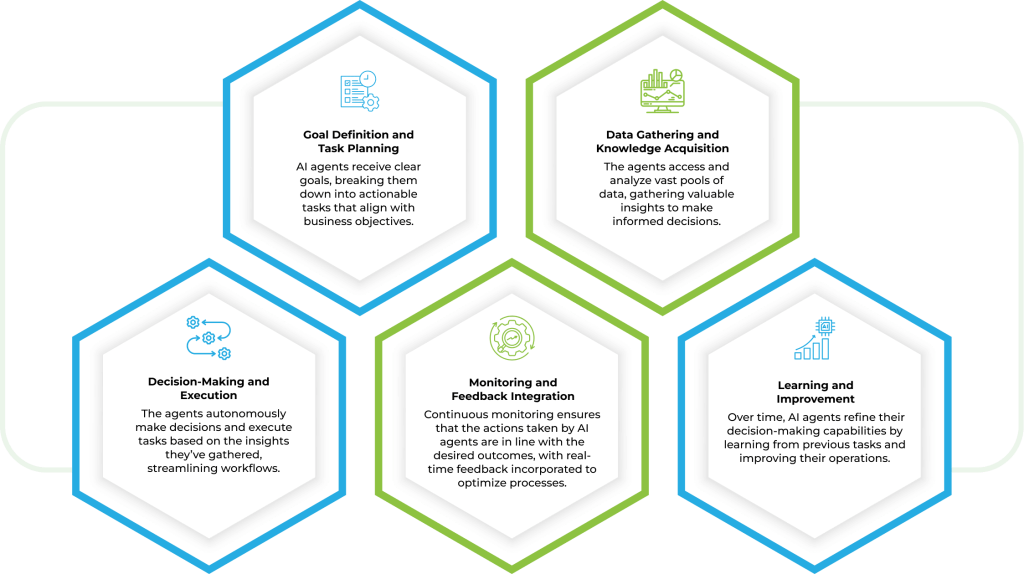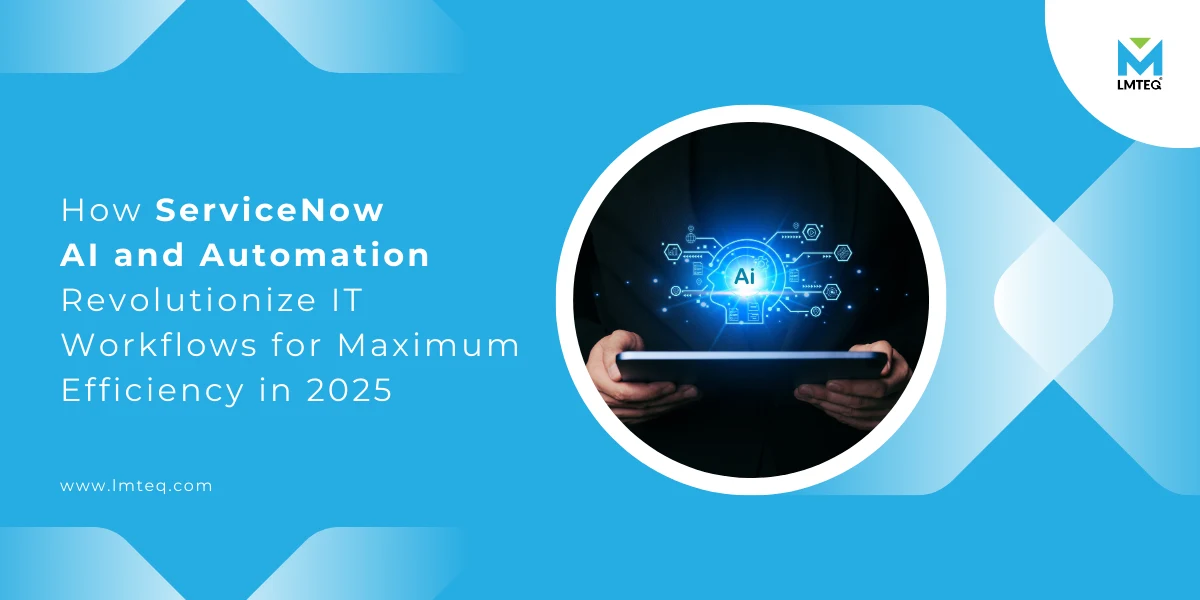For decades, IT organizations have been trapped by inefficiencies, with most efforts yielding suboptimal results. According to Bill McDermott, CEO of ServiceNow, 85% of IT investments fail to deliver proper ROI, creating frustrated teams and dissatisfied customer.
This is where ServiceNow’s AI and automation capabilities step in, revolutionizing how IT workflows operate. By automating repetitive tasks, predicting issues before they escalate, and enhancing overall efficiency, ServiceNow empowers businesses to break free from limitations and deliver more value in less time.
Recent statistics show that 31% of organizations have already automated critical operations, with 41% integrating automation across multiple workflows. ServiceNow not only accelerates this transformation but also provides an intelligent, unified platform that ensures seamless operations, better decision-making, and improved customer satisfaction.
In this article, we explore how ServiceNow AI and automation can streamline your IT workflows, minimize bottlenecks, unlock the true potential of your business operations
Feel free to jump to a particular section to learn more about ServiceNow AI and Automation:
Challenges Hindering IT Workflow Efficiency
To understand the transformative impact of ServiceNow AI and automation, it’s essential to examine the persistent challenges faced by IT organizations. These pain points highlight the inefficiencies and roadblocks that modern IT workflows encounter:
1. Escalating Costs Due to Fragmented IT Ecosystems
The increasing adoption of decentralized work models has amplified the operational burdens on IT teams. When systems and tools are not integrated, IT teams are forced to manage siloed processes, driving inefficiencies and increasing overhead costs.
This fragmentation leads to:
- Slower resolutions for IT incidents and service requests.
- Uneven user experiences that frustrate employees and customers alike.
- Wasted resources and rising expenses as teams struggle to connect the dots between disconnected systems.
Organizations must find a way to centralize IT processes to reduce costs while boosting operational efficiency.
2. Scaling IT Operations Without Growing Pains
Expanding IT’s capabilities is a daunting task, especially when resources are constrained. As businesses evolve, the IT team is expected to manage an increasing volume of incidents without limitless staff or budgets. Remote and hybrid work arrangements further complicate matters by creating visibility gaps:
- Domain-specific monitoring systems often signal “all clear” statuses, even when critical business functions may be compromised elsewhere.
- Without holistic insights into cross-domain performance, IT teams risk overlooking potential service disruptions or their broader implications.
- The inability to address problems proactively leaves users dissatisfied and negatively impacts customer loyalty.
Achieving true scalability requires IT teams to shift from reactive issue management to proactive and predictive solutions.
3. Poor Service Delivery and User Experiences
The expectations of today’s workforce and customers have changed dramatically. People now demand fast, seamless, and transparent service delivery. However, outdated workflows and processes fail to deliver:
- Users are frequently met with complex, disjointed systems that hinder their ability to access support.
- IT teams lack the tools to track, prioritize, and resolve tickets efficiently, leading to delayed or uncoordinated responses.
- Over-reliance on manual workflows consumes valuable time and increases the potential for human error.
This results in dissatisfaction for both employees and customers, eroding trust and putting additional pressure on IT staff.
How ServiceNow AI and Automation Streamlines IT Workflow in an Organization
ServiceNow leverages its cutting-edge AI and automation capabilities to address the pain points of IT organizations, transforming their workflows into efficient, scalable, and responsive systems. Here are some key ways ServiceNow AI and ServiceNow Automation optimize IT workflows:
1. Intelligent Workflow Routing
With ServiceNow Workflow Automation, requests are routed intelligently using AI-driven classification. By analyzing historical data and contextual information, ServiceNow directs tasks to the most suitable teams. This reduces manual sorting, enhances response times, and allows IT staff to concentrate on mission-critical activities.
2. Real-Time Workload Balancing
The platform’s dynamic workload balancing feature uses ServiceNow AI Capabilities to assess workload distribution across teams in real-time. By allocating resources effectively, bottlenecks are minimized, productivity is enhanced, and operational goals are met efficiently.
3. Proactive Incident Detection and Prevention
Harnessing ServiceNow IT Automation, AI-powered algorithms detect potential incidents before they occur. By analyzing patterns and trends in data, the system enables proactive interventions to reduce downtime, improve operational continuity, and strengthen IT resilience.
4. Personalized Recommendations for End-Users
With ServiceNow Now Assist, users receive tailored insights and solutions. AI provides relevant knowledge articles, workflow suggestions, and best practices, empowering users to resolve issues or advance projects independently. This personalization increases both efficiency and satisfaction.
5. Advanced Search for IT Professionals
ServiceNow’s AI Capabilities also extend to its powerful search functionality. By understanding user intent and context, the platform delivers accurate and relevant results quickly. This reduces time spent searching for information, enabling IT professionals to focus on key responsibilities.
6. AI-Powered Development Assistance
ServiceNow Intelligent Automation aids developers through Now Assist for Creators, which offers AI-driven suggestions for code and workflows. This functionality ensures high-quality development, accelerates delivery timelines, and enhances the overall software development experience.
7. Predictive Analytics for Smarter Resource Planning
Utilizing Automation in ServiceNow, predictive analytics anticipate resource requirements by analyzing historical trends. IT teams can allocate resources more effectively, ensuring they are prepared for evolving organizational needs and preventing resource shortages.
8. Adaptive Process Automation
ServiceNow Process Automation streamlines cross-enterprise workflows by digitizing and managing business processes with precision. This automation promotes compliance by ensuring that workflows meet both organizational and regulatory standards while driving continuous improvements. It also fosters collaboration across departments and enhances transparency by providing clear visibility into workflow outcomes. With these capabilities, organizations can optimize efficiency and maintain agility to adapt seamlessly to evolving business needs.
9. Reduced Manual Tasks for Improved Focus
ServiceNow Robotic Process Automation (RPA) eliminates mundane, repetitive tasks such as logging into applications and copying and pasting information. By empowering employees with self-service options, the platform reduces IT workload, saves time, and allows teams to focus on strategic priorities, ultimately boosting morale and productivity.
ServiceNow Agentic AI – The Future of Smart IT Workflow Management
As organizations continue to face the pressure of optimizing IT workflows, ServiceNow Agentic AI provides a groundbreaking solution to enhance productivity and streamline operations. Unlike traditional AI tools, Agentic AI empowers IT teams with intelligent agents that autonomously handle tasks across various processes, allowing employees to focus on higher-value activities. This shift from AI as an assistant to AI as a capable workforce amplifies productivity and agility within IT environments.
At the core of ServiceNow Agentic AI lies the ability to leverage autonomous AI agents that reason, learn, and act independently with minimal human intervention. Integrated into the ServiceNow Now platform, these AI agents collaborate with IT teams, automating repetitive tasks while continuously learning from their actions to improve their performance. This creates a seamless, efficient workflow that boosts organizational efficiency.
Here’s how ServiceNow Agentic AI operates in five essential stages:

1. Goal Definition and Task Planning – AI agents receive clear goals, breaking them down into actionable tasks that align with business objectives.
2. Data Gathering and Knowledge Acquisition – The agents access and analyze vast pools of data, gathering valuable insights to make informed decisions.
3. Decision-Making and Execution – The agents autonomously make decisions and execute tasks based on the insights they’ve gathered, streamlining workflows.
4. Monitoring and Feedback Integration – Continuous monitoring ensures that the actions taken by AI agents are in line with the desired outcomes, with real-time feedback incorporated to optimize processes.
5. Learning and Improvement – Over time, AI agents refine their decision-making capabilities by learning from previous tasks and improving their operations.
Related Reads:
Benefits of ServiceNow AI and Automation
ServiceNow AI and automation bring key benefits to IT workflows:
- Enhanced Efficiency – Automating routine tasks allows teams to focus on more important projects.
- Faster Resolution – AI quickly identifies and resolves issues, reducing downtime.
- Scalability – Easily manage growing demands without expanding resources.
- Cost Savings – Automation cuts operational costs while optimizing resource use.
- Better User Experience – Faster responses and proactive resolutions improve satisfaction for both employees and customers.
Key Takeaway
Incorporating ServiceNow AI and Automation into IT workflows transforms how organizations operate, driving efficiency, scalability, and cost savings while improving service delivery. At LMTEQ, a trusted ServiceNow build, consulting, and implementation partner, we specialize in implementing ServiceNow solutions and configuring custom workflows tailored to your IT operations. Our expertise in AI-driven automation ensures you maximize the potential of your IT environment.
Ready to optimize your IT workflows with ServiceNow AI and automation?
Contact LMTEQ today to start your transformation journey!
